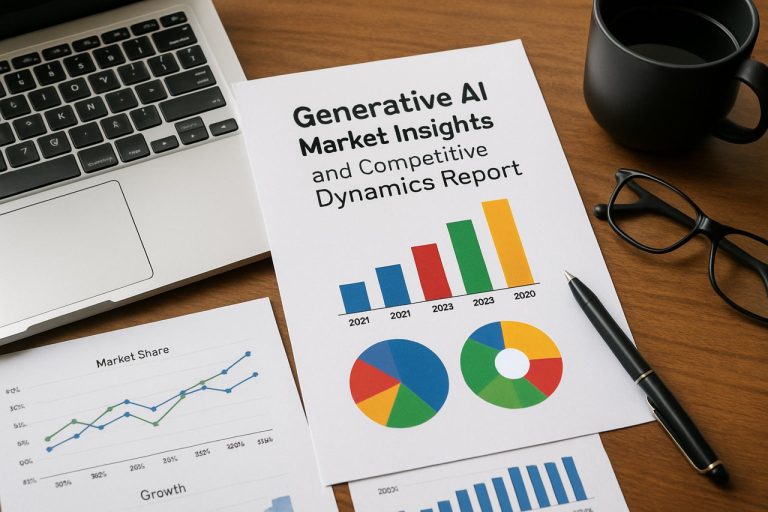
Unveiling the AI-Powered Shift: How Artificial Intelligence Is Redefining Internet Search and Browsing Experiences
- Market Overview: The Evolving Landscape of AI in Search and Browsing
- Emerging Technology Trends Shaping AI-Enhanced Web Experiences
- Competitive Landscape: Key Players and Strategic Moves
- Growth Projections and Market Expansion Opportunities
- Regional Insights: Adoption Patterns and Market Dynamics
- Future Outlook: The Next Phase of AI in Online Search
- Challenges and Opportunities in the AI-Driven Search Ecosystem
- Sources & References
“AI technologies are rapidly reshaping how we find information online.” (source)
Market Overview: The Evolving Landscape of AI in Search and Browsing
The integration of artificial intelligence (AI) into internet search and browsing is fundamentally reshaping how users access, interpret, and interact with online information. Traditional keyword-based search engines are rapidly evolving, leveraging advanced AI models to deliver more relevant, personalized, and context-aware results. This transformation is driven by breakthroughs in natural language processing (NLP), machine learning, and generative AI technologies.
One of the most significant advancements is the deployment of large language models (LLMs) such as OpenAI’s GPT-4 and Google’s Gemini, which power conversational search experiences and summarize complex information in real time. For example, Google’s Search Generative Experience (SGE) uses generative AI to provide synthesized answers, reducing the need for users to click through multiple links. Similarly, Microsoft’s AI-powered Bing integrates chat-based search, allowing users to ask complex questions and receive detailed, conversational responses.
AI is also enhancing personalization in search and browsing. Algorithms now analyze user behavior, preferences, and context to tailor results, improving relevance and engagement. According to Statista, the global AI in search market was valued at $2.7 billion in 2023 and is projected to reach $14.7 billion by 2030, reflecting rapid adoption across industries.
- Semantic Search: AI enables search engines to understand user intent and the contextual meaning of queries, moving beyond simple keyword matching. This results in more accurate and nuanced answers.
- Visual and Multimodal Search: Tools like Google Lens and Bing Visual Search use AI to interpret images, enabling users to search using photos or screenshots, further expanding how information is accessed.
- Voice Search: With the proliferation of smart speakers and mobile assistants, AI-driven voice search is becoming mainstream. Insider Intelligence reports that over 123 million U.S. adults used voice assistants monthly in 2023.
As AI continues to advance, the future of internet search and browsing will likely be defined by even greater interactivity, personalization, and efficiency, fundamentally changing how users discover and consume information online.
Emerging Technology Trends Shaping AI-Enhanced Web Experiences
Artificial Intelligence (AI) is fundamentally reshaping how users search for and interact with information on the internet. Traditional keyword-based search engines are rapidly evolving into intelligent systems capable of understanding context, intent, and even anticipating user needs. This transformation is driven by advances in natural language processing (NLP), machine learning, and large language models (LLMs) such as OpenAI’s GPT-4 and Google’s Gemini.
One of the most significant changes is the rise of conversational search. Instead of typing fragmented keywords, users can now ask complex, natural-language questions and receive direct, contextually relevant answers. For example, Google’s Search Generative Experience (SGE) leverages generative AI to synthesize information from multiple sources, providing concise summaries and actionable insights at the top of search results (Google Blog).
AI is also enhancing personalization. Search engines and browsers now analyze user behavior, preferences, and location data to deliver tailored results and recommendations. Microsoft’s Bing, powered by OpenAI, integrates chat-based search and visual search, allowing users to interact with search results in a more intuitive way (Microsoft Blog).
Visual and multimodal search capabilities are another emerging trend. Tools like Google Lens and Bing Visual Search enable users to search using images instead of text, expanding the possibilities for discovery and accessibility (Google Lens). These AI-driven features are particularly valuable for e-commerce, travel, and education sectors.
Furthermore, AI is improving web accessibility by generating real-time captions, translating content, and summarizing long articles. Browsers such as Microsoft Edge and Google Chrome are integrating AI-powered reading assistants and summarization tools, making web content more digestible and inclusive (The Verge).
According to Statista, the global AI in search market is projected to reach $14.7 billion by 2030, reflecting the rapid adoption of these technologies. As AI continues to advance, the future of internet search and browsing will be defined by greater efficiency, personalization, and accessibility, fundamentally changing how users interact with the web.
Competitive Landscape: Key Players and Strategic Moves
The competitive landscape of internet search and browsing is undergoing a seismic shift as artificial intelligence (AI) technologies become central to product innovation and user experience. Major tech companies are racing to integrate advanced AI models into their search engines and browsers, fundamentally altering how users access and interact with information online.
- Google: As the dominant player, Google has rapidly infused AI into its core products. The launch of Search Generative Experience (SGE) in 2023 marked a significant leap, using generative AI to provide summarized answers and context-rich results. Google’s Gemini model powers these features, aiming to maintain its leadership as user expectations evolve.
- Microsoft Bing: Microsoft has aggressively positioned Bing as an AI-first search engine, integrating OpenAI’s GPT-4 into both Bing and the Edge browser. This move has led to a reported 100 million daily active users milestone for Bing, challenging Google’s dominance and spurring further innovation.
- OpenAI: While not a traditional search provider, OpenAI’s ChatGPT and its web browsing capabilities are redefining how users retrieve information. The introduction of Browse with Bing allows users to access real-time web data, blurring the lines between conversational AI and search engines.
- Emerging Players: Startups like Perplexity AI and You.com are leveraging AI to offer conversational, context-aware search experiences. These platforms focus on transparency, source attribution, and privacy, appealing to users seeking alternatives to big tech.
Strategically, these players are investing in proprietary AI models, partnerships, and ecosystem integrations. For example, Google and Microsoft are embedding AI assistants directly into browsers, while OpenAI is expanding plugin ecosystems. The result is a rapidly evolving market where AI-driven search and browsing are setting new standards for relevance, personalization, and interactivity (Statista).
Growth Projections and Market Expansion Opportunities
Artificial Intelligence (AI) is fundamentally reshaping the landscape of internet search and browsing, driving significant growth projections and opening new market expansion opportunities. The integration of AI technologies—such as natural language processing (NLP), machine learning, and generative AI—into search engines and browsers is enhancing user experience, increasing efficiency, and enabling more personalized and context-aware results.
According to Grand View Research, the global AI market size was valued at $196.63 billion in 2023 and is expected to expand at a compound annual growth rate (CAGR) of 36.6% from 2024 to 2030. A significant portion of this growth is attributed to the adoption of AI in search and browsing technologies. For instance, the rise of AI-powered search engines like Microsoft’s Bing (integrated with OpenAI’s GPT-4) and Google’s Search Generative Experience (SGE) is transforming how users interact with information online.
- Personalization and Contextualization: AI enables search engines to deliver highly personalized results by analyzing user behavior, preferences, and intent. This leads to more relevant search outcomes and improved user satisfaction (Forbes).
- Conversational Search: The adoption of large language models (LLMs) allows users to interact with search engines in natural, conversational language, making information retrieval more intuitive and accessible (Search Engine Journal).
- Visual and Multimodal Search: AI-driven visual search capabilities, such as Google Lens, enable users to search using images and videos, expanding the scope of search beyond text-based queries (Statista).
These advancements are creating new market opportunities for businesses to develop AI-powered search tools, browser extensions, and advertising solutions. The global search engine market is projected to reach $234.8 billion by 2028, with AI-driven features being a key growth driver (MarketsandMarkets).
In summary, AI is not only transforming the technical capabilities of internet search and browsing but also unlocking substantial growth and expansion opportunities for technology providers, advertisers, and content creators worldwide.
Regional Insights: Adoption Patterns and Market Dynamics
The adoption of artificial intelligence (AI) is fundamentally reshaping internet search and browsing across global regions, with varying patterns and market dynamics emerging in response to local technological infrastructure, consumer behavior, and regulatory environments.
North America remains at the forefront of AI-driven search innovation, led by major players like Google and Microsoft. The integration of generative AI, such as Google’s Search Generative Experience (SGE) and Microsoft’s Bing AI, is enhancing search relevance, personalization, and conversational capabilities. According to Statista, Google continues to dominate with over 90% market share in the U.S., but Bing’s AI-powered features have contributed to a modest uptick in its usage since 2023. The region’s high digital literacy and robust investment in AI startups further accelerate adoption.
Europe is witnessing rapid AI adoption in search, but with a strong emphasis on privacy and data protection. The European Union’s Digital Markets Act and AI Act are shaping how companies deploy AI in search engines, requiring transparency and user control. European search engines like Qwant and Ecosia are leveraging AI for improved results while differentiating through privacy-centric approaches. According to European Parliament, these regulations are expected to influence global standards for AI in search.
Asia-Pacific is experiencing the fastest growth in AI-powered search, driven by mobile-first markets and super-app ecosystems. China’s Baidu and South Korea’s Naver are integrating advanced AI models to deliver voice, image, and contextual search. According to Mordor Intelligence, the Asia-Pacific AI market is projected to grow at a CAGR of 32.5% through 2028, with search and browsing as key application areas.
- Latin America and Africa are in earlier stages of AI search adoption, but mobile internet expansion and local language AI models are driving increased engagement. Regional players are focusing on lightweight AI solutions to address bandwidth and device constraints (GSMA).
Overall, AI is transforming search and browsing by making them more intuitive, personalized, and multimodal. Regional differences in adoption reflect local market needs, regulatory frameworks, and technological readiness, shaping the future competitive landscape of internet search.
Future Outlook: The Next Phase of AI in Online Search
Artificial Intelligence (AI) is rapidly reshaping the landscape of internet search and browsing, ushering in a new era of personalized, intuitive, and efficient information discovery. Traditional keyword-based search engines are evolving into sophisticated AI-powered platforms capable of understanding context, intent, and even anticipating user needs.
One of the most significant advancements is the integration of large language models (LLMs) like OpenAI’s GPT-4 and Google’s Gemini, which enable search engines to process natural language queries and generate conversational, context-aware responses. For example, Google’s Search Generative Experience (SGE) leverages generative AI to provide summarized answers, suggest follow-up questions, and offer deeper insights directly on the search results page. This reduces the need for users to click through multiple links, streamlining the search process.
AI is also enhancing personalization. By analyzing user behavior, preferences, and search history, AI algorithms can deliver tailored results and recommendations. Microsoft’s AI-powered Bing integrates chat-based search, allowing users to interact with the engine in a conversational manner and receive more relevant, context-specific information.
Visual and multimodal search capabilities are another frontier. Tools like Google Lens use AI to interpret images, enabling users to search using photos instead of text. This is particularly valuable for shopping, travel, and education, where visual context is crucial.
- Efficiency: AI reduces the time spent searching by surfacing direct answers and automating routine queries.
- Discovery: AI-driven recommendations help users uncover new content, products, and services aligned with their interests.
- Accessibility: Voice assistants and natural language processing make search more accessible to users with disabilities or those less comfortable with traditional interfaces.
Looking ahead, the next phase of AI in online search will likely focus on even deeper personalization, real-time data integration, and seamless multimodal experiences. As AI models become more advanced, they will not only answer questions but also anticipate needs, transforming search engines into proactive digital assistants. According to Statista, the global AI search engine market is projected to reach $14.7 billion by 2030, underscoring the transformative impact AI will continue to have on how we find and interact with information online.
Challenges and Opportunities in the AI-Driven Search Ecosystem
Artificial Intelligence (AI) is fundamentally reshaping the landscape of internet search and browsing, introducing both significant challenges and promising opportunities for users, businesses, and technology providers. The integration of AI into search engines has led to more personalized, context-aware, and conversational experiences, moving beyond traditional keyword-based queries to deliver richer and more relevant results.
- Enhanced Search Capabilities: AI-powered search engines, such as Google’s Search Generative Experience (SGE), leverage large language models (LLMs) to generate comprehensive answers, summarize web content, and provide follow-up suggestions. This shift enables users to obtain nuanced information quickly, reducing the need to sift through multiple links (Google Blog).
- Conversational Interfaces: The rise of AI chatbots like Microsoft’s Copilot and Google’s Gemini is transforming browsing into an interactive dialogue. Users can ask complex, multi-part questions and receive synthesized responses, making information retrieval more intuitive (Microsoft Copilot).
- Personalization and Context Awareness: AI systems analyze user behavior, preferences, and context to tailor search results. This personalization enhances user satisfaction but raises concerns about filter bubbles and privacy (Pew Research Center).
- Challenges in Content Discovery: As AI-generated answers become more prevalent, traditional web traffic patterns are disrupted. Publishers and content creators face reduced visibility and lower click-through rates, prompting a reevaluation of SEO strategies (SEMrush).
- Opportunities for Innovation: The AI-driven search ecosystem opens new avenues for businesses to engage users through structured data, voice search optimization, and AI-friendly content formats. Companies investing in AI integration are better positioned to capture emerging market share (Gartner).
- Ethical and Regulatory Considerations: The use of AI in search raises questions about transparency, bias, and misinformation. Regulators and industry leaders are working to establish guidelines to ensure responsible AI deployment (FTC).
In summary, AI is revolutionizing how people search and browse the internet, offering smarter, faster, and more personalized experiences. However, these advancements also introduce new complexities that stakeholders must navigate to ensure a fair, open, and innovative digital ecosystem.
Sources & References
- How AI Is Transforming Internet Search and Browsing
- Google Blog
- Statista
- Insider Intelligence
- Google Lens
- The Verge
- Gemini
- You.com
- Grand View Research
- Forbes
- Search Engine Journal
- MarketsandMarkets
- Qwant
- European Parliament
- Naver
- Mordor Intelligence
- Microsoft Copilot
- Pew Research Center
- SEMrush
- FTC



